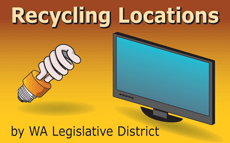
Frequently Asked Questions
Product Stewardship and Extended Producer Responsibility (EPR): what’s the difference?
How does Product Stewardship affect me?
How do I get in touch with the Council?
What is product stewardship?
Product stewardship is the concept that whoever designs, produces, sells, or uses a product shares in the responsibility for dealing with the environmental impact of the product – even when the product has reached its end of life. The greatest responsibility lies with whoever has the most ability to affect the life cycle environmental impacts of the products, i.e., the manufacturer. In other words, if you make it, you provide a means to take it back, usually by financing programs to take back the products and recycle or dispose of them in an environmentally-sound manner. The actual collection, transportation and recycling services are most often performed by others but are paid for by the product manufacturers who then pass the costs on to the consumer in the price of the product, rather than financing waste systems through garbage fees or taxes. See What is Product Stewardship?
Product Stewardship and Extended Producer Responsibility (EPR): what’s the difference?
Product Stewardship and Extended Producer Responsibility (EPR) are terms that are often used interchangeably to describe a long-term solution to manage waste products by shifting the responsibility for collection, transportation, and management of products away from local governments to manufacturers. Basically, product stewardship is a “shared responsibility” approach, in which all stakeholders (producers, retailers, local and state governments, solid waste collection companies, and consumers) share in the responsibility for making sure products are managed properly. Extended producer responsibility places the responsibility directly on the product manufacturer. Several definitions for each of the terms exist. The Product Stewardship Institute, Product Policy Institute, the California Product Stewardship Council and others define EPR as “a mandatory type of product stewardship…” See What is Product Stewardship? for more on definitions and terms.
Why Product Stewardship?
Even though most local governments provide basic recycling services, many can’t afford to recycle the vast array of products that could be recycled, or should be managed properly, because the products contain toxic materials (such as electronics or fluorescent light bulbs) or are expensive and difficult to manage. Therefore many products – and valuable resources – get thrown away.
In a Product Stewardship system, product manufacturers help create a system to recycle or properly dispose of their products. In most cases, the recycling program is managed by a “Stewardship Organization” on behalf of the manufacturers. The Stewardship Organization contracts with local collectors, recyclers and processors to provide the recycling service. The program is funded by passing on the cost of the service to the consumer – when the consumer buys the product, they are automatically purchasing the recycling service. Producers are therefore economically involved in the system and have an incentive to make products that are more recyclable, less toxic and easier to return and/or reuse.
Who is the NWPSC?
The Council is a coalition of governments and other organizations in Washington and Oregon that operates as an unincorporated association of members. Council members collaborate and share information through regular meetings and conference calls. See About the NWPSC for more.
What does the NWPSC do?
The Council is a coalition of government organizations in Washington and Oregon. We work together, and with other governments, businesses and nonprofit groups, to encourage creation of product stewardship systems for end-of-life products that are expensive to handle, create hazards, or otherwise don’t currently fit in with the existing garbage and recycling system.
The Council focuses its work on products that meet specific criteria such as products that are toxic or difficult to handle. Work is conducted via subcommittees comprised of Steering Committee Members, Associates and other stakeholders. See About for more and to view the full Mission Statement.
How does Product Stewardship affect me?
Product stewardship distributes the responsibility for managing products that are toxic or difficult to recycle among many different stakeholders. Consumers ultimately pay for product stewardship programs by purchasing the product and do their part by returning unwanted products to collection channels for recycling. Product stewardship lowers local governments’ costs to manage waste, increases private sector waste and recycling jobs, conserves vital resources, and reduces toxic materials in garbage and landfills. See How You Are Involved and How Product Stewardship Works for more.
What can I do?
All products are designed with the consumer in mind: you choose between competing products. Your buying power can help drive the decisions of retailers and manufacturers to make less toxic and easier to recycle products. Make your voice heard:
- Before you buy a product, do your homework. Does the manufacturer or retailer take back and recycle their products?
- Ask the sales person if the manufacturer or the store will take back and recycle the product when you no longer need it. If you're buying a product to replace one, ask if they will recycle your old one.
- Contact manufacturers who make the products you buy and let them know you would like them to offer a take back program.
- Share your knowledge and choices with your friends and family.
Become part of the product stewardship movement in the Northwest. Whether you want to help design programs or just get the latest news, there is a membership level for you – join the Northwest Product Stewardship Council.
How do I get in touch with the Council?
Contact the Council Co-chairs with questions and comments by email or phone:
- Washington co-chair Adrian Tan: 206-263-8635
- Oregon co-chair Pam Peck: 503-797-1760
